
May 4

Hitler: Door of the Scots, Vienna, 1911
1911 Adolf Hitler is ordered by a court in Linz to surrender his orphan's pension to his sister, Paula. From court records:
Adolf Hitler, now living as an artist at 27 Meldemannstrasse, XX District, has testified as follows in the court of Leopoldstadt: He is able to maintain himself, and agrees to the transfer of the full amount of his orphan’s pension to his sister and, in addition, inquiries have revealed that Adolf is in possession of considerable sums of money given to him by his Aunt Johanna Poelzl, for the purpose of advancing his career as an artist.
From the memoirs of August Kubizek—Hitler's best friend:
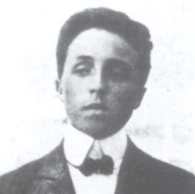
[Orphans] of under twenty-four years of age, with no means of their own, were entitled to claim an orphan's pension amounting to one half of the widow's pension which their mother had been receiving. Frau Hitler had received a pension of 100 crowns a month since her husband's death; therefore, Adolf and Paula were entitled to a total of 50 crowns a month, and Adolf's share was thus 25 crowns a month. This, of course, was not enough for him to live on: for example, he had to pay 10 crowns a month for his room at Mrs. Zakreys'.The application was granted, and the first payment was made on February 12, 1908, when Adolf was already in Vienna. Incidentally, three years later he renounced his share in favor of his sister Paula, although he could have continued to claim it until he reached the age of twenty-four, i.e., in April, 1913. The document of renunciation, dated May 4th, 1911, is still in the possession of his guardian, Joseph Mayrhofer.
The document concerning the inheritance, which Adolf signed in the presence of his guardian before he left for Vienna, also mentioned his share in his father's estate, amounting to about seven hundred crowns. It is possible that he had already spent part of this money during his previous stay in Vienna, but in view of his very economical way of life—the only large item in his budget was books—he was left with enough to tide him over at least the beginning of his new sojourn there.
As regards our future together, Adolf was more fortunate than I, not only because he had some capital and a fixed monthly income, however small—a matter which I had still to arrange with my parents—but also because, having prevailed over his guardian, he was free to make his own decisions, whereas my decisions were subject to my parents' confirmation. For me, moreover, moving to Vienna meant giving up the trade I had learned, whereas Adolf could continue to lead there more or less his previous life. [For further details, Click here.]

Fromelles Watercolor, 1915, by Hitler
1915 World War I: List Regiment: Gefreiter Adolf Hitler's 16 Reserve Infantry Regiment occupy a position, at Fromelles, which is on a level field with water channels, willow trees and willow stalks, in the distance towards the enemy lines lie an insignificant wood with barbed wire entanglements. Under the direction of their defense-minded commander, Lieutenant General Gustav Scanzoni von Lichtenfels, the regiment works ceaselessly day and night in the subsequent weeks, to further fortify their position at Fromelles. [For further details, Click here.]
1916 World War I: Gefreiter Adolf Hitler endures trench warfare in Flanders (Artois) with 3 Company, 16 Reserve Infantry Regiment [List Regiment]. [For further details, Click here.]
Germany agrees to limit its submarine warfare:
On this day in 1916, Germany responds to a demand by U.S. President Woodrow Wilson by agreeing to limit its submarine warfare in order to avert a diplomatic break with the United States.
Unrestricted submarine warfare was first introduced in World War I in early 1915, when Germany declared the area around the British Isles a war zone, in which all merchant ships, including those from neutral countries, would be attacked by the German navy. A string of German attacks on merchant ships—culminating in the sinking of the British passenger ship Lusitania on May 7, 1915—led President Wilson to put pressure on the Germans to curb their navy. Fearful of antagonizing the Americans, the German government agreed to put restrictions on the submarine policy going forward, incurring the anger and frustration of many naval leaders, including the naval commander in chief, Admiral Alfred von Tirpitz, who resigned in March 1916.
On March 24, 1916, soon after Tirpitz's resignation, a German U-boat submarine attacked the French passenger steamer Sussex, in the English Channel, thinking it was a British ship equipped to lay explosive mines. Although the ship did not sink, 50 people were killed, and many more injured, including several Americans. On April 19, in an address to the U.S. Congress, President Wilson took a firm stance, stating that unless the Imperial German Government should now immediately declare and effect an abandonment of its present methods of warfare against passenger and freight carrying vessels this Government can have no choice but to sever diplomatic relations with the Government of the German Empire altogether.
To follow up on Wilson's speech, the U.S. ambassador to Germany, James W. Gerard, spoke directly to Kaiser Wilhelm on May 1 at the German army headquarters at Charleville in eastern France. After Gerard protested the continued German submarine attacks on merchant ships, the Kaiser in turn denounced the American government's compliance with the Allied naval blockade of Germany, in place since late 1914. Germany could not risk American entry into the war against them, however, and when Gerard urged the Kaiser to provide assurances of a change in the submarine policy, the latter agreed.
On May 6, the German government signed the so-called Sussex Pledge, promising to stop the indiscriminate sinking of non-military ships. According to the pledge, merchant ships would be searched, and sunk only if they were found to be carrying contraband materials. Furthermore, no ship would be sunk before safe passage had been provided for the ship's crew and its passengers. Gerard was skeptical, writing in a letter to the U.S. State Department that German leaders, forced by public opinion, and by the von Tirpitz and Conservative parties would take up ruthless submarine warfare again, possibly in the autumn, but at any rate about February or March, 1917.
Gerard's words proved accurate, as on February 1, 1917, Germany announced the resumption of unrestricted submarine warfare. Two days later, Wilson announced a break in diplomatic relations with the German government, and on April 6, 1917, the United States formally entered World War I on the side of the Allies. (History.com)
1917 World War I: List Regiment: Gefreiter Adolf Hitler's 16 Reserve Infantry Regiment, 3 Company, participate in the Arras action, being redeployed east of Vimy Ridge. [For further details, Click here.]
1918 World War I: List Regiment: Gefreiter Adolf Hitler's 16th RIR is sent back to hold a sector near an earlier position at Laon. [For further details, Click here.]
1919 Various:
May Fourth Movement: Chinese students from thirteen universities meet in Peking and draft five resolutions that:
1. Oppose the granting of Shandong to the Japanese under former German concessions.
2. Draws awareness of China's precarious position to the masses in China.
3. Recommends a large-scale gathering in Peking.
4. Promotes the creation of a Peking student union.
5. A demonstration be held that afternoon in protest at the terms of the Treaty of Versailles.
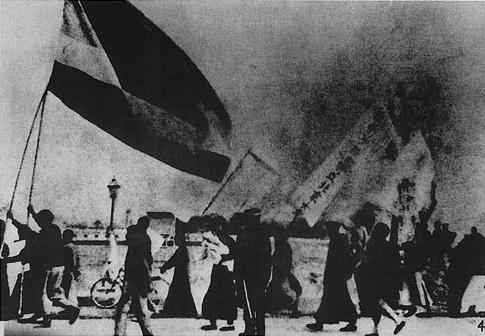
The May Fourth Movement was a thoroughly anti-imperialist and anti-feudal revolutionary movement. Young students acted as its pioneers. The Chinese working class went up on the political stage, and functioned as the main force in the later period of the movement. Li Dazhao, Chen Duxiu and other intellectuals directed and promoted the development of the movement, and played leading roles in it. On the local level, future Communist Party leader Mao Zedong rallied opposition against Hunan's warlord Chang Ching-yao.
The May Fourth Movement covered more than 20 provinces and over 100 cities of the country. It had a broader popular foundation than the Revolution of 1911. Its great contribution lay in arousing the people's consciousness and preparing for the unity of the revolutionary forces. The May Fourth Movement promoted the spreading of Marxism in China, and prepared the ideological foundation for the establishment of the Chinese Communist Party. The October Revolution pointed out the direction for the Chinese revolution. The May Fourth Movement, which took place after the October Socialist Revolution, was a part of the world's Proletarian Revolution.
Death: Milan R. Stefanik: Slovak General: in a mysterious plane crash over Bratislava. Stefanik is soon succeeded by Edouard Benes, a Czech.
1923 Weimar: An early example of Hitler's speechifying:
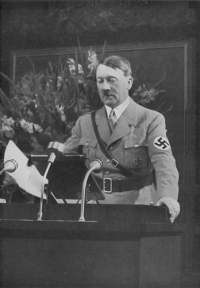
The Government should also have asked itself: who is willing to undertake active resistance in Germany? Only those to whom Germany still means something. Not the parliamentary blabbermouths, not the scum who are our politicians today, but only the men who wear a steel helmet and the swastika. [For the full text of Hitler's speech, Click here.]
1929 Birth: Audrey Hepburn:
On this day in 1929, Edda van Heemstra Hepburn-Ruston—who will one day be better known to legions of film fans as Audrey Hepburn—is born near Brussels, Belgium.
The daughter of an English banker and a Dutch baroness, Hepburn was attending school in London when World War II erupted in Europe. During the war, the Nazis occupied Holland, where the young Audrey and her mother were staying, and the family suffered many hardships. Hepburn continued to pursue her ballet studies, and at war's end, she returned to London, where she modeled and began acting in small parts on stage and screen. [For further details, Click here]
1931 Credit-Anstalt: Austria's principal bank, among others, fails due to French financial pressure. The collapse is seen by many as an attempt to prevent an Anschluss (union) between Germany and Austria. [See: Austria: The Other Germany.]
1933 Holocaust: A second ordinance of the Law for the Restoration of the Civil Service is published.
1938 Death: Carl von Ossietzky: radical German pacifist and recipient of the 1935 Nobel Peace Prize. He was convicted of high treason and espionage in 1931 after publishing details of Germany's alleged violation of the Treaty of Versailles by rebuilding the Luftwaffe and training pilots in the Soviet Union. On 28 February 1933, after the Reichstag fire, he was arrested. He was detained at the concentration camp Esterwegen near Oldenburg, among other camps. Still in police custody, he died in Berlin's Nordend hospital, of tuberculosis and from the after-effects of the abuse he suffered in the concentration camps.
1939 Telegram: German Chargé in the Soviet Union (Tippelskirch) to German Foreign Office:
Appointment of Molotov as Foreign Commissar simultaneously retaining his position as Chairman of the Council of People's Commissars is published by the Presidium of the Supreme Soviet of May 3 by Soviet press with great fanfare. Dismissal of Litvinov (Note: Litvinov is a Jew.) appears on last page as small notice under 'Chronicle.' Sudden change has caused greatest surprise here, since Litvinov was in the midst of negotiations with the English delegation, at the May Day Parade still appeared on the reviewing stand right next to Stalin, and there was no recent concrete evidence of shakiness in his position. Soviet press contains no comments. Foreign Commissariat is giving press representatives no explanations. Since Litvinov had received the English Ambassador as late as May 2 and had been named in press of yesterday as guest of honor at the parade, his dismissal appears to be result of spontaneous decision by Stalin. The decision apparently is connected with the fact that differences of opinion arose in the Kremlin on Litvinov's negotiations. Reason for differences of opinion presumably lies in deep mistrust that Stalin harbors toward the entire surrounding capitalist world. At last Party Congress Stalin urged caution lest Soviet Union be drawn into conflicts. Molotov (no Jew) is held to be 'most intimate friend and closest collaborator' of Stalin. His appointment is apparently to guarantee that the foreign policy will be continued strictly in accordance with Stalin's ideas.
1940 World War II: Various:
War at Sea: The Polish destroyer Grom is sunk near Narvik.
From the secret diary of Harold Ickes: US Secretary of the Interior:
Chamberlain appears to be facing a political test in Great Britain. Practically from the beginning of his premiership I have regarded him as the evil genius not only of Britain but of Western civilization. His diplomatic policy has been blundering and inept. Hitler always out-smarted him until Germany was strengthened to that point where it could go to war with confidence of a victorious result.
1941 World War II: Various:
War in the Air: May 4-11 Heavy German air raids over Liverpool, Glasgow, and Hull. [See: Why Did Hitler Lose The Battle of Britain?]
Hitler gives his seventh major speech of World War II in the Reichstag in Berlin:
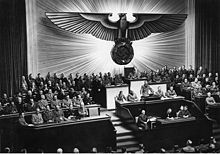
At a time when only deeds count and words are of little importance, it is not my intention to appear before you, the elected representatives of the German people, more often than absolutely necessary. The first time I spoke to you was at the outbreak of the war when, thanks to the Anglo-French conspiracy against peace, every attempt at an understanding with Poland, which otherwise would have been possible, had been frustrated. The most unscrupulous men of the present time had, as they admit today, decided as early as 1936 to involve the Reich, which in its peaceful work of reconstruction was becoming too powerful for them, in a new and bloody war and, if possible, to destroy it. They had finally succeeded in finding a State that was prepared for their interests and aims, and that State was Poland. [For the full text of Hitler's speech, Click here.]
1942 Various:
World War II: FDR to Stalin:

We are having grave difficulties with the northern convoy route and have informed Litvinov of the complications. You may be sure, however, that no effort will be omitted to get as many ships off as possible . . . . I am looking forward to seeing Molotov and the moment I hear of the route we shall make preparations to provide immediate transportation. I do hope Molotov can stay with me in the White House while he is in Washington but we can make a private home nearby available if that is desired.
Holocaust: The killing center at Auschwitz goes into operation, first at Auschwitz itself—then at the nearby camp of Birkenau—where four gas chambers and crematoria are built during late 1942 and early 1943 (total victims: 1.5 - 2 million, survivors: 2,000+). Note: Some Jews from each deportation are selected to live as slave laborers, some at Birkenau itself, others at nearby factories, including a synthetic oil and rubber plant later built at Monowitz. At Birkenau many Jews, particularly women, are selected by SS doctors for bizarre and painful medical experiments. During the War, Birkenau will be known as Auschwitz II and Monowitz as Auschwitz III or "Buna.") (THP)
1943 World War II: The Ukrainian Galician division of the Waffen-SS is announced by the Wehrmacht, and will be manned by thousands of volunteers urged on by Ukrainian leaders and the Ukrainian Catholic Church.
1944 World War II: Various:
Churchill to (British Foreign Secretary) Anthony Eden:
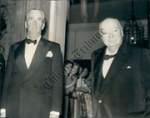
[Broadly] speaking the issue is: are we going to acquiesce in the Communization of the Balkans and perhaps Italy? . . . . I am of the opinion on the whole that we ought to come to a definite conclusion about it, and that if our conclusion is that we resist the Communist infusion and invasion we should put it to them plainly at the best moment that military events permit. We should have to consult the United States first . . . . Evidently we are approaching a showdown with the Russians about their Communist intrigues in Italy, Yugoslavia, and Greece. I think their attitude becomes more difficult every day. [See: Did Adolf Hitler Cause the Cold War?]
Poland: In Owcarnia, 17 AK (Polish Freedom Fighters) soldiers are murdered by the People's Army (Communist-led Polish underground).
1945 World War II: Various:
Hermann Goering—having finally talked his SS 'captors' into letting him go—writes a letter to Grand Admiral Karl Doenitz complaining of Martin Bormann's intrigues against him and his resultant loss of status. He offers his services as official German negotiator to Eisenhower—'as one marshal to another'—and reminds him of how well he had done in the past 'in all the important negotiations abroad with which the Fuehrer always entrusted me before the war.' 'Moreover,' he continues, 'both Great Britain and America have proved through their press and radio, and in the declarations of their statesman over the last few years, that their attitude toward me is more favorable than toward all other political leaders in Germany.' Doenitz never replies. (Read)
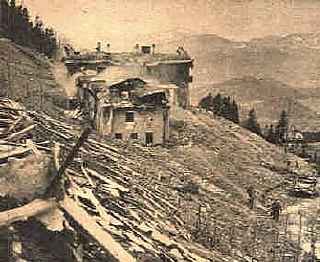
World War II: Eagle's Nest: An SS detachment burns Hitler's Berghof. The US 7th Army captures Hitler's country retreat of Berchtesgaden.
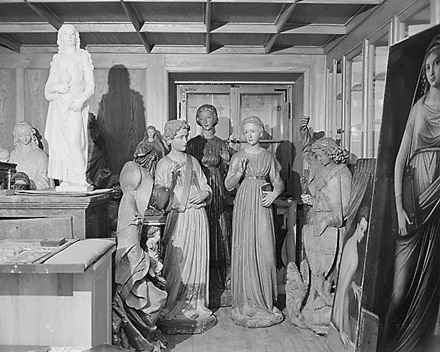

Hans Fritzsche—who has been in the hands of the Red Army since May 2—is made to identify the charred bodies of Goebbels and his family. It will be several days before he is informed that he is under arrest, then he will be transported to the infamous prison Lubyanka. He will undergo months of severe solitary confinement before ultimately ending up in Nuremberg. (Heydecker, Maser)
Hermann Goering surrenders to the Allies.
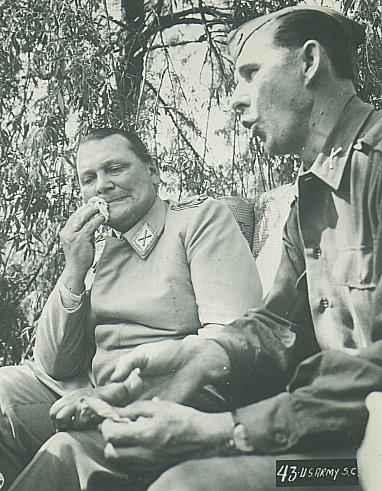
In the final phase of his life he (Goering) suffered from profound illusion. In April 1945 he had been dismissed with ignominy from all his posts, arrested, and bequeathed a curse. But when he heard of Hitler's death, he was, his wife recalled, 'close to despair' and exclaimed, 'He's dead, Emmy. Now I shall never be able to tell him that I was true to him till the end!' In much the same way as Himmler, he hoped to be accepted by the Allies as a partner in negotiations. As General Bodenschatz has testified, soon after his capture by the Americans his main concern was the proclamation which he intended to make to the German people as soon as he had reached a satisfactory agreement with Eisenhower. His claim to the leadership of the Reich after Hitler's death was indisputable in his view.
Even at Nuremberg he compelled his fellow prisoner the Grand Admiral Doenitz to admit that he owed his own 'nomination as the Fuehrer's successor solely to coincidence'. And if Goering defended himself before the International Court of Justice with striking skill and some aggressiveness, behind which some of the old elemental force of his personality could be felt, it was because of his conviction that his role as leader placed greater responsibility upon him than upon the other prisoners. Obstinately and at times not without success, he tried to command them, to influence their statements, and to establish a regime which Speer referred to angrily as 'Goering's dictatorship'. At last, after so many years, so many blows and humiliations, for a brief and fruitless span he had reached his goal: to be the First Man and 'Nazi Number One', as he called himself.
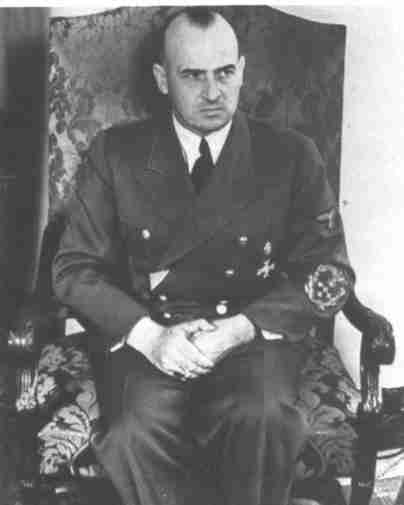
Hans Frank is captured by American troops at Tegernsee near Berchtesgaden: Upon his capture, and after a severe beating from two American soldiers, he tries to cut his own throat. Two days later, he will lacerate his left arm in a second unsuccessful suicide attempt. Note: Only Julius Streicher, of all the other defendants, will reportedly be similarly mistreated in captivity. (Maser)
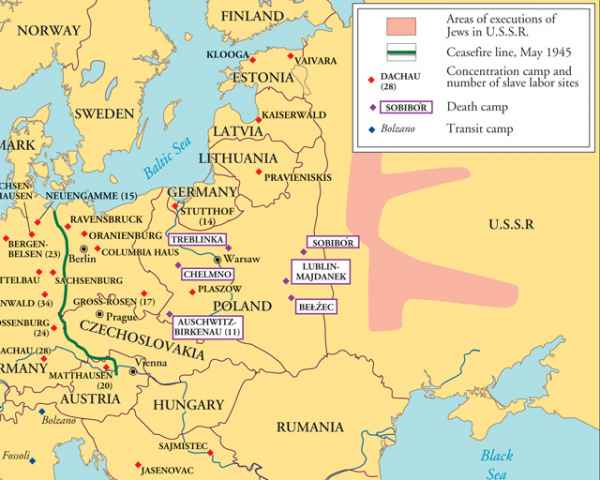
Holocaust: Neuengamme liberated:
At the end of 1944, approximately 10,000-12,000 prisoners remained incarcerated in the Neuengamme concentration camp, with another 37,000-39,000 in the subcamps. This figure included almost 10,000 women. Toward the end of the war, the death rate among prisoners in the Neuengamme system, which had been steadily climbing, reached catastrophic proportions. In the winter of 1944-1945, 1,700 prisoners died each month; in February 1945 alone, nearly 2,500 prisoners died.
As British troops approached Neuengamme, the SS evacuated some 9,000 prisoners towards Lübeck on the Baltic Sea on April 19, 1945, and murdered most of the remaining 3,000 prisoners in the camp. Some 700 almost exclusively German prisoners remained behind to destroy the internal documents of the camp. Half of them were conscripted into an SS armed unit; the remainder evacuated the camp on April 30, leaving it empty.
British forces arrived on May 4, 1945. In early May 1945, the SS loaded some 9,000-10,000 prisoners—most of them evacuated from Neuengamme and its subcamps—onto three ships anchored in the Baltic Sea off the coast of Neustadt in Schleswig-Holstein. Some 7,000 lost their lives when the British attacked two of the ships in the course of a raid on the harbor on May 3. The Thielbek, carrying about 2,000 prisoners, sank quickly. The Cap Arcona, carrying more than 4,500 prisoners, burned and capsized during the attack. Only about 600 prisoners from both ships survived.
The death register at Neuengamme indicates that about 40,000 prisoners died in the camp by April 10, 1945. Perhaps as many as 15,000 more died in the camp in the following week and during the course of the evacuation. In all, more than 50,000 prisoners, almost half of all those imprisoned in the camp during its existence, died in Neuengamme concentration camp. [For further details, Click here]
Churchill to Eden (San Francisco):
I fear terrible things have happened during the Russian advance through Germany to the Elbe. The proposed withdrawal of the United States Army to the occupational lines which were arranged with the Russians and Americans in Quebec, and which were marked in yellow on the maps we studied there, would mean the tide of Russian Domination sweeping forward 120 miles on a front of 300 or 400 miles. This would be an event which, if it occurred, would be one of the most melancholy in history.
After it was over and the territory occupied by the Russians, Poland would be completely engulfed and buried deep in Russian occupied lands. What would in fact be the Russian frontier would run from the North Cape of Norway, along the Finnish-Swedish frontier, across the Baltic to a point east of Luebeck, along the at present agreed line of occupation and along the frontier between Bavaria to Czechoslovakia to the frontiers of Austria, which is nominally to be in quadruple occupation, and half-way across that country to the Isonzo river, behind which Tito and Russia will claim everything to the east . . . .
This constitutes an event in the history of Europe to which there has been no parallel, and which has not been face by the Allies in their long and hazardous struggle. The Russian demands on Germany for reparations alone will be such as to enable her to prolong the occupation almost indefinitely . . . .
We have several powerful bargaining counters on our side, the use of which might make for a peaceful agreement. First, the Allies ought not to retreat from their present positions to the occupational line until we are satisfied about Poland, and also about the temporary character if the Russian occupation of Germany, and the conditions to be established in the Russianized or Russian-controlled countries in the Danube valley, particularly Austria and Czechoslovakia, and the Balkans. Secondly, we may be able to please them about the exits from the Black Sea and the Baltic as part of a general settlement. All these matters can only be settled before the United States armies in Europe are weakened. If they are not settled before the United States armies withdraw from Europe and the Western World folds up its war machines there are no prospects of a satisfactory solution and very little of preventing a third World War. It is to this early and speedy showdown with Russia that we must now turn our hopes. Meanwhile I am against weakening our claim against Russia on behalf of Poland in any way. I think it should stand where it was put in the telegrams from the President and me.
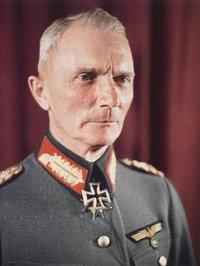
Death: Fedor von Bock: General Field Marshal with monarchist sympathies. Bock won the prestigious Pour le Mérite in World War I and rose rapidly through the ranks. He served Hitler in Austria, Poland, Holland, Belgium, and France. Commanding Army Group Center during Barbarossa, he was relieved of command for his failure to take Moscow. He had the same bad luck in 1942 when he again failed to capture one of his Fuehrer's pet objectives, Stalingrad. Permanently retired by a disgusted Hitler, he is killed in an Allied bombing raid. [For further details, Click here.]
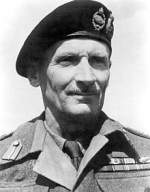
Field Marshal Montgomery announces that all enemy forces in the Netherlands, Northwest Germany and Denmark have surrendered unconditionally.
As the Nazi threat dies, the Red Army rises:
On this day in 1945, Soviet Foreign Minister Molotov informs U.S. Secretary of State Stettinius that the Red Army has arrested 16 Polish peace negotiators who had met with a Soviet army colonel near Warsaw back in March. When British Prime Minister Winston Churchill learns of the Soviet double-cross, he reacts in alarm, stating, "There is no doubt that the publication in detail of this event . . . would produce a primary change in the entire structure of world forces."
Churchill, fearing that the Russian forces were already beginning to exact retribution for losses suffered during the war (the Polish negotiators had been charged with "causing the death of 200 Red Army officers"), sent a telegram to President Harry Truman to express his concern that Russian demands of reparations from Germany, and the possibility of ongoing Russian occupation of Central and Eastern Europe, "constitutes an event in the history of Europe to which there has been no parallel." Churchill clearly foresaw the "Iron Curtain" beginning to drop. Consequently, he sent a "holding force" to Denmark to cut off any farther westward advance by Soviet troops. (History.com)
1946 Nuremberg Tribunal: On day 121 of deliberations, Walter Funk testifies on his own behalf:
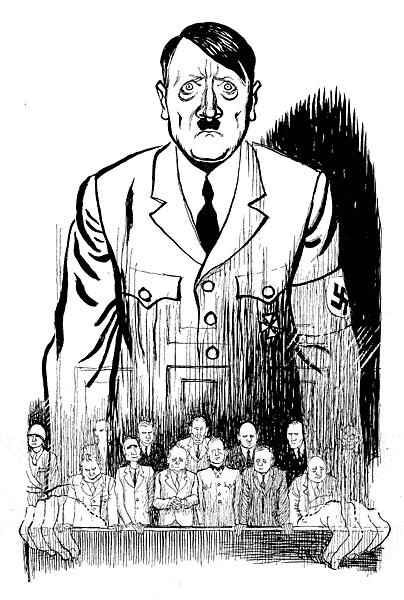
Dr. Sauter: Now for your connection with the Party. Were you a member of any organization of the Party-SA, SS, or any other section of the Party?
Funk: I never belonged to any organization of the Party, neither SA nor SS, nor any other organization; and as I have already said, I did not belong to the Leadership Corps.
Dr. Sauter: You did not belong to the Leadership Corps?
Funk: No.
Dr. Sauter: You know, Dr. Funk, that the Party functionaries, that is, the Party veterans, and so forth, met annually in November at Munich. You have yourself seen a film showing this anniversary meeting. Were you ever invited to these gatherings on 8 and 9 November?
Funk: I do not know whether I received invitations; it is possible. But I have never been at such a gathering, for these meetings were specially intended for old Party members and the Party veterans, in commemoration of the March on the Feldherrnhalle. I never participated in these gatherings, as I was averse to attending large gatherings. During all this time I attended a Party rally only once, just visiting one or two functions. Mass gatherings always caused me physical pain. [For Funk's full testimony, Click here.]
1948 The Naked and the Dead:
Twenty-five-year-old Norman Mailer's first novel . . . is published on this day in 1948. The book is critically acclaimed and widely considered one of the best novels to come out of World War II. [For further details, Click here]
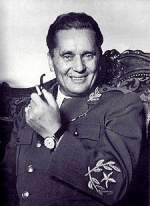
1980 Death: Josip Broz Tito: communist leader of Yugoslavia since 1945, passes away at the age of 88 in Belgrade. During his 35-year rule, Tito guided Yugoslavia along a pathway that combined dogmatic allegiance to Marxism with an independent, and often combative, relationship with the Soviet Union. [For further details, Click here]
1990 Latvia: The Supreme Soviet of the Latvian SSR declares the restoration of independence of Latvia, stating that the Molotov-Ribbentrop Pact and the Soviet occupation of Latvia in 1940 were illegal. [For further details, Click here.]
Edited by Levi Bookin (Copy editor)
levi.bookin@gmail.com



Click to join 3rdReichStudies


Please note that the list-owner and the moderator are not responsible for, and do not necessarily approve of, the random ads placed on our pages by our web server. They are, unfortunately, the price one pays for a 'free' website.
FAIR USE NOTICE: This site may contain copyrighted material the use of which has not always been specifically authorized by the copyright owner. We are making such material available in our efforts to advance understanding of historical, political, human rights, economic, democracy, scientific, environmental, and social justice issues, etc. We believe this constitutes a 'fair use' of any such copyrighted material as provided for in section 107 of the US Copyright Law. In accordance with Title 17 U.S.C. Section 107, the material on this site is distributed without profit to those who have expressed a prior interest in receiving the included information for research and educational purposes. If you wish to use copyrighted material from this site for purposes of your own that go beyond 'fair use', you must obtain permission from the copyright owner.